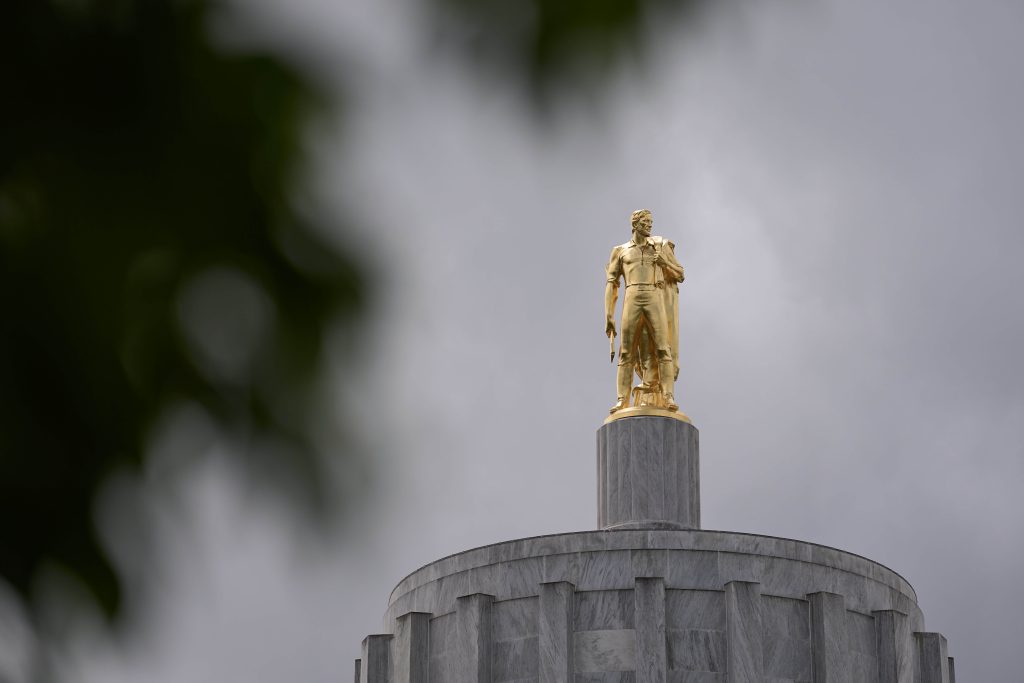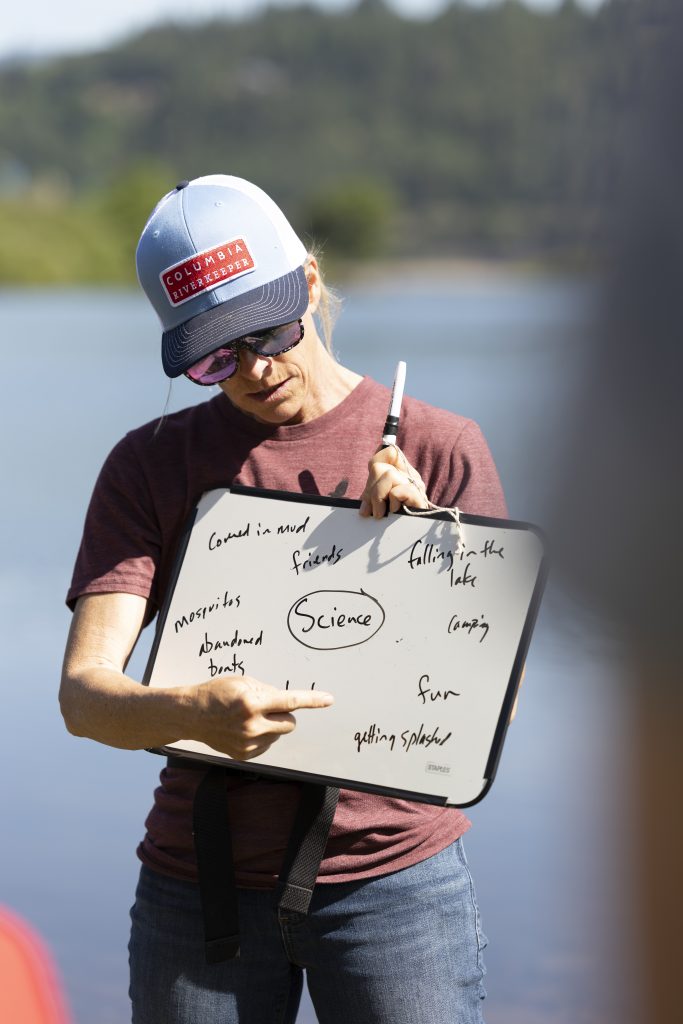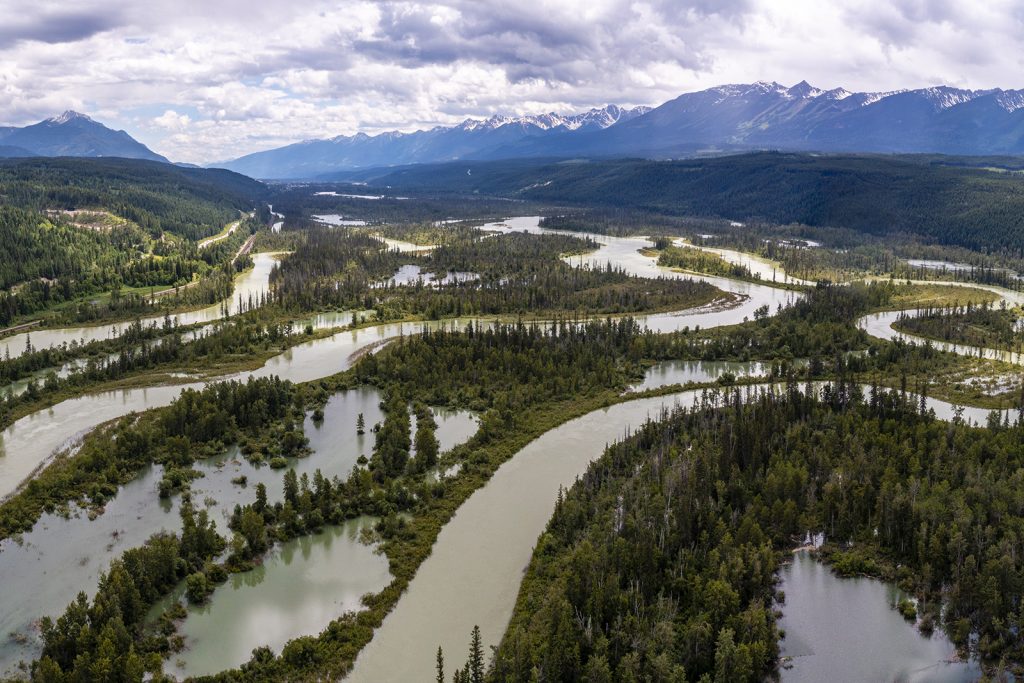By Miles Johnson, Legal Director and Kelly Campbell, Policy Director
Originally published in Columbia Riverkeeper “Currents” Issue 1, 2025
The governments of Oregon and Washington have immense influence over the health of the Columbia River and its communities, and strengthening state level protections is now more important than ever.

Once again, we are forced to confront a Trump administration that is openly hostile to many civil and human rights—including our basic rights to clean water and clean air. We’ve been here before, but this time feels different (and worse). What has not changed is Columbia Riverkeeper’s dedication to living our values and advancing our mission. Thanks to your support, here are 10 ways Columbia Riverkeeper is protecting the Columbia during the second Trump administration.
Focusing on State Legislatures
With the federal government in chaos, we focused on the Oregon and Washington legislatures like never before in 2025. We have grown our team in recent years, and that additional capacity allowed us to engage much more deeply in state-level lawmaking than we have in the past. And just in time, too! We took a lead role in opposing efforts to open Oregon to nuclear development, and we pushed back against attempts in Washington to weaken Clean Water Act regulations and cut funding for the Columbia Gorge National Scenic Area. We supported partner-led legislation including efforts to fix Oregon’s broken groundwater pollution laws and to strengthen environmental justice protections in Washington. The governments of Oregon and Washington have immense influence over the health of the Columbia River and its communities, and strengthening state-level protections is now more important than ever.
Defending Social Justice
We refuse to retreat from our values. We refuse to scrub terms like “environmental justice” and “diversity” from our website and communications. We refuse to take the pronouns off our email signatures. We refuse to give in to this government’s—or any government’s—attempt to frighten and bully us into silence.
And, while words clearly matter, our commitments go deeper than terminology. We work in solidarity with underserved communities in the Columbia River Basin to achieve tangible, shared goals. For example, Columbia Riverkeeper is proud to be joining the Oregon for All Coalition, proud of supporting Yakama Nation’s efforts to protect the sacred Pushpum site from energy development, and proud to have advocated for the Planning for Healthy Communities Act—an ambitious environmental justice bill proposed in the Oregon legislature.
Enforcing the Clean Water Act
While federal agencies under the Trump administration ignore illegal pollution, Columbia Riverkeeper goes to court and stops it. Our newest staff attorney, Teryn Yazdani (who just celebrated her one-year anniversary with Columbia Riverkeeper) is focused on holding polluters accountable. Using the Clean Water Act, we make sure companies stop their illegal pollution and pay a penalty to deter future violations—and we send that money to Tribes and community groups for projects to protect and restore the Columbia River. When government regulators look the other way, Columbia Riverkeeper steps up.
Taking the Long View
It’s tempting, and sometimes necessary, to focus on the Trump administration’s bad, weird, or just plain stupid idea of the day. (Yes, we actually had to explain to reporters why the Columbia River cannot be turned on and off like a “big faucet.”) But some of the challenges we face will take decades or longer to fully resolve, and we can’t afford to get knocked off course.
That’s why we remain focused on big, long-term projects that are essential to the health of the Columbia and its people. These projects include securing radioactive and toxic waste at Hanford, removing the four Lower Snake River dams and replacing their services, and cleaning up toxic PCB contamination at Bonneville Dam. These essential actions, and others, will exist far beyond the end of the Trump administration, so we are continuing to push for progress despite the daily chaos within our federal government.

Opposing Presidential Overreach
We pick our battles, but we are directly opposing several illegal attempts by the Trump administration to circumvent or destroy our nation’s laws protecting clean water and habitat for important species.
In coordination with Tribes, states, and national nonprofits, we are pushing back against Trump’s fake “Energy Emergency” declaration that could fast-track permits for projects—like the NEXT refinery and Cable under the Columbia—that pose serious risks to the Columbia and river communities. We are also opposing the Trump administration’s efforts to shrink the scope of the Clean Water Act and legalize the destruction of salmon and steelhead habitat. Fortunately, we are not working alone, which allows us to focus on preventing these illegal policy changes from harming the Columbia.
Reaching the Next Generation
Part of protecting and restoring the Columbia River for the next generation means teaching that generation about the river they will inherit. A clean and safe Columbia for everyone is not a static goal that can be permanently achieved; it is a reciprocal commitment to our home that must be passed down, and reaffirmed, over time.
We are reaching the next generation of river users and defenders in many ways. This spring, Community Organizer Juan Monje and Senior Community Organizer Kate Murphy taught roughly 3,000 Portland middle school students how to identify safe fish to eat from the Bonneville Dam area. Science & Education Director Lorri Epstein continued her work at the Nichols Natural Area in Hood River, engaging students from Gorge schools in hands-on outdoor learning and environmental education. Senior Staff Attorney & Hanford Program Director Simone Anter developed youth-focused materials and a Hanford Journey event especially for students. Through these efforts, we hope to encourage a new generation to explore and love the Columbia River—because we protect what we love.
Focusing on State and Local Decisions
Our state and local governments in Oregon and Washington often have authority to protect the Columbia River from risky or dangerous proposals. Convincing states to use their authority can be difficult, but Columbia Riverkeeper’s combination of grassroots organizing, savvy communications, and legal muscle has a way of motivating public officials. And these strategies are more important than ever now that federal environmental agencies are in disarray, or worse.
Our campaign to stop the Zenith fuel terminal is a good example. Advocacy to the City of Portland resulted in an agreement to phase out shipments of crude oil and, more recently, a resolution to further investigate Zenith’s conduct. At the same time, we are pushing the Oregon Dept. of Environmental Quality to deny a Clean Air Act permit that would allow Zenith to expand its fuel-handling operations.
With respect to the NEXT diesel refinery proposed near Clatskanie, OR, we are suing the Oregon Dept. of Environmental Quality for illegally issuing a water quality certification. We hope that a successful lawsuit will force Oregon to reconsider, and ultimately deny, the permit for this dangerous refinery.
Tracking Emerging Threats
We aren’t taking our eye off the ball when it comes to new threats to the Columbia River and our climate. Emerging technologies and the push to decarbonize have led to opportunities, but also challenges, for Columbia River communities. That’s why we are working hard to understand the implications of the data center boom on water needs and electricity systems. We are also looking into new proposals—like the Drax wood pellet facility in Longview—that are using climate greenwashing to garner support for dirty or harmful activities.
Supporting Our Partners
We are stronger together, and in these troubling times, we are emphasizing our support for Tribes and partner organizations that share our goals of a clean and safe Columbia River for everyone. Recently, we were proud to supporand join the Healing Snake River Journey, a project of the non-profit Khimstonik. And we continue to partner with Yakama Nation’s Environmental Restoration Waste Management Program to fund a portion of the program’s STEM coordinator position.
We are mindful of our partners’ access to resources. At a time when many Tribes and nonprofits have seen essential federal funding disappear, we are sending hundreds of thousands of dollars from Clean Water Act penalties to support our partners’ efforts to protect and restore the Columbia.
Celebrating 25 Years!
No matter what, we will continue to live our value of hope. That’s why we are celebrating 25 years of protecting the Columbia River—and looking forward to the next 25! We hope that you can make time to join us in Portland on Thursday, October 23, for a celebration of everything we have accomplished, and will accomplish, together. In dark times, hope and community are more important than ever.

